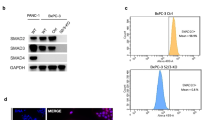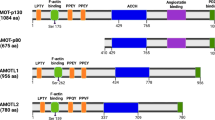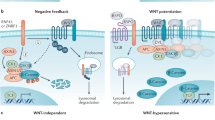Abstract
The recently described family of Smad molecules are essential mediators of transforming growth factor beta (TGF-beta) signalling. To date, seven members of this family have been identified, each of which plays a specific and separate role in mediating TGF-beta superfamily gene transcription. At least two different Smads, Smad2 and Smad4 (DPC4), have been implicated in human cancer and appear to have tumour-suppressor functions. Loss of function of Smad4 is most strongly associated with human pancreatic and colorectal malignancy. Furthermore, work from several different groups has suggested associations between Smad4 loss and malignancy in a number of other tissues. Here, we present a review of the current state of the literature implicating the central Smad mediator, Smad4, in the development of cancer.
This is a preview of subscription content, access via your institution
Access options
Subscribe to this journal
Receive 24 print issues and online access
$259.00 per year
only $10.79 per issue
Buy this article
- Purchase on Springer Link
- Instant access to full article PDF
Prices may be subject to local taxes which are calculated during checkout
Similar content being viewed by others
Author information
Authors and Affiliations
Rights and permissions
About this article
Cite this article
Duff, E., Clarke, A. Smad4 (DPC4) - a potent tumour suppressor?. Br J Cancer 78, 1615–1619 (1998). https://doi.org/10.1038/bjc.1998.731
Issue Date:
DOI: https://doi.org/10.1038/bjc.1998.731
This article is cited by
-
Smad4 haploinsufficiency: a matter of dosage
PathoGenetics (2008)
-
Clinical significance of prognostic and predictive markers in colorectal cancer
The Pharmacogenomics Journal (2002)
-
Distinct chromosomal abnormality pattern in primary liver cancer of non-B, non-C patients
Oncogene (2000)



